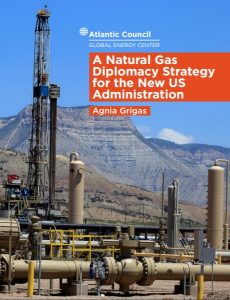Full Title: A Natural Gas Diplomacy Strategy for the New US Administration
Author(s): Agnia Grigas
Publisher(s): Atlantic Council Global Energy Center
Publication Date: January 1, 2017
Full Text: Download Resource
Description (excerpt):
The new US presidential administration of Donald J. Trump and the newly elected Congress will have an opportunity to reassess the country’s domestic natural gas policies and its natural gas diplomacy strategy in the face of transformed global natural gas markets. Natural gas is on the verge of becoming a global commodity, a development that has been spearheaded by a boom in US shale gas production, the growth of the global liquefied natural gas (LNG) trade, and a buildup of gas transport infrastructure worldwide. As a result of the shale boom, the United States has emerged as the world’s greatest producer of natural gas and is rising to become a leading exporter of LNG. In 2016, the first US LNG deliveries made their way to Latin America, Europe, Asia, and the Gulf. The United States has also been instrumental in changing the conventional practices of the international gas trade: away from a reliance on long-term contracts to the introduction of spot trading, and away from gas prices that are linked to oil to those that are linked to “Henry Hub,” the foremost US natural gas trading hub. These practices are gaining wider acceptance. As an emerging energy superpower, the United States should take on a leadership role in the global natural gas markets to support its allies in Europe, contain its adversaries, and reshape relations with rising Asian powers. Already, Russia’s energy influence is waning in its historic markets in Europe, its old backyards of the Caucasus and Central Asia, and Asia where it hopes to gain new markets. By leveraging its energy influence and formulating a gas diplomacy strategy, Washington can favorably realign strategic relations between the world powers. Continued political support for easing regulations on LNG exports, improved pipeline infrastructure in the United States, and new trade agreements would support the United States’ breakout position in the global gas markets. By strengthening its cooperation with NATO countries and other allies over energy security—including by exporting technology and expertise and providing investment or funding on shale development and LNG trade—the United States would cement its leadership position in the new geopolitics of gas.
